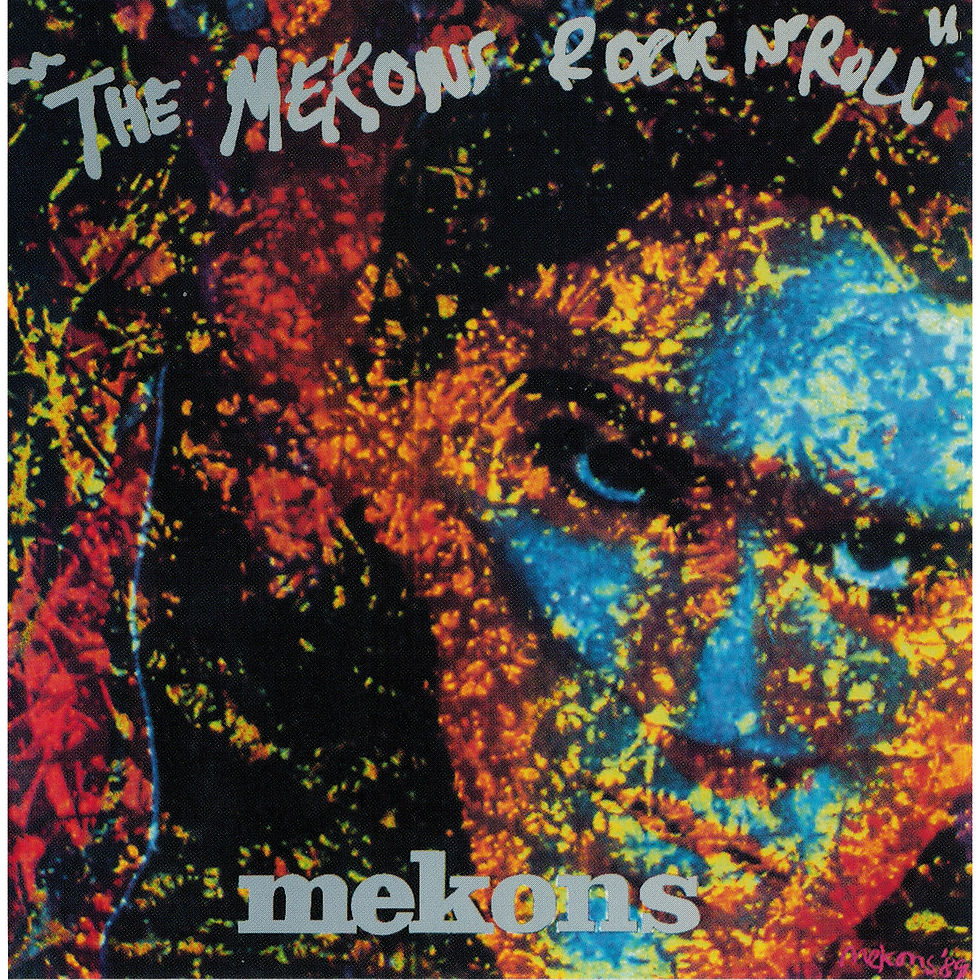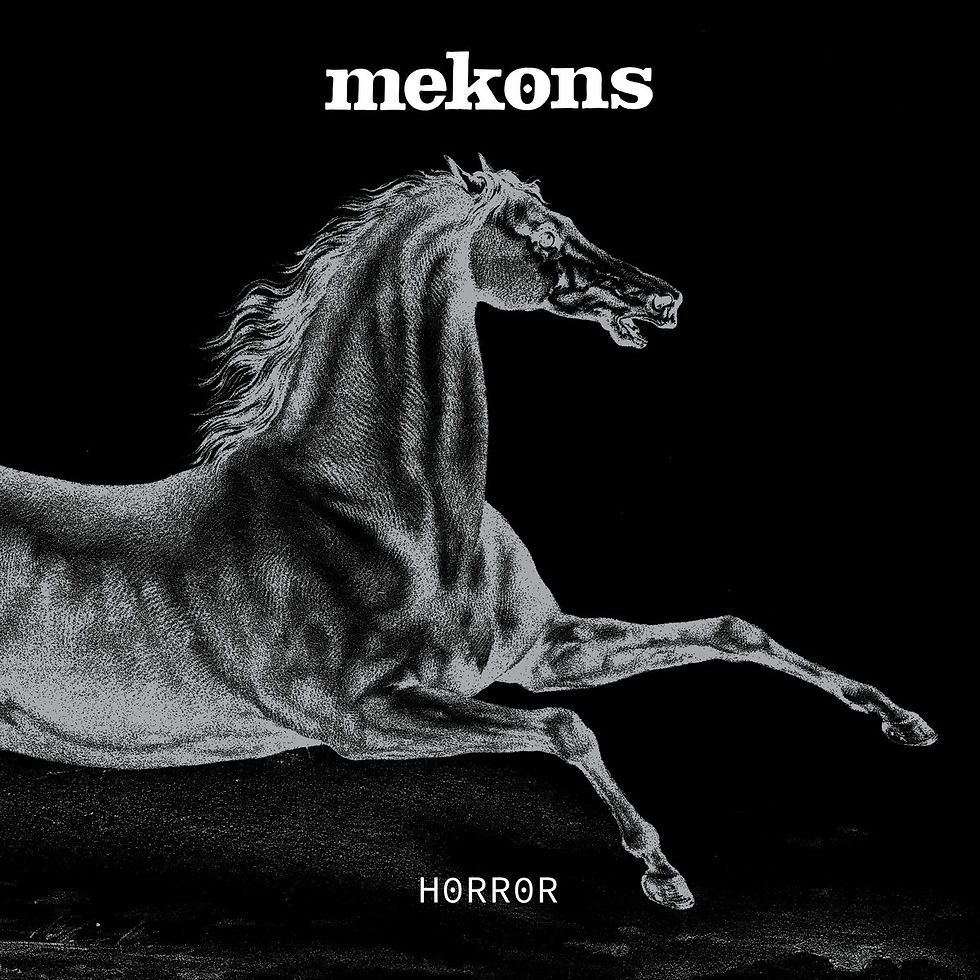Mekonic Resilience: Jon Langford on the Mekons’ Shape-Shifting Legacy and Why “Horror” Might Be Their Most Timely Work Yet | The Sharp Notes Interview
- ezt

- Jul 8, 2025
- 5 min read
The Band's US Tour Begins on July 9th: Dates Below
The Mekons have always operated on the fringes—of genre, tradition, and industry expectations. Formed in the late 1970s in Leeds during the first wave of British punk, the group has evolved into something far more expansive: a long-running collective that blends music, politics, and art in ways that consistently defy categorization. Their newest release, Horror, arrives as what the band believes is a reflection of our turbulent times and a continuation of the band’s enduring commitment to creative freedom and collaboration. Rather than offering clear answers or tidy messages, the Mekons invite listeners to sit with discomfort, irony, and reflection.
Recorded in Valencia, Spain, Horror showcases the band’s signature blend of musical styles—punk, country, dub, polka, folk, and more—while grappling with weighty themes like colonial legacy, climate anxiety, and human displacement. The album’s textured, often haunting sound reflects the improvisational, communal spirit in which it was made. With contributions from longtime members including Sally Timms, Susie Honeyman, and Rico Bell, the record feels deeply rooted and exploratory. Horror speaks to the present moment and connects to a decades-long thread of Mekons work that places storytelling, resistance, and absurdity at its core.
On a personal note, my connection to the Mekons began early. As a young record collector, one of the first LPs I remember stumbling across in a used bin was The Mekons Rock ’N’ Roll (1989). Even before the needle hit the vinyl, the album stood out—bold, mysterious, and entirely its own. Listening to it felt like discovering a new language for what music could do: how it could challenge, entertain, and provoke all at once. That early encounter helped shape my understanding of music as both art and commentary.

In the following interview, founding member Jon Langford reflects on the creation of Horror, the band’s collaborative process, and the ways the Mekons have managed to evolve while remaining dynamic. With honesty, humor, and a deep sense of history, Langford offers insight into how a band can remain vibrant and relevant across decades—by staying curious, adaptable, and defiantly unclassifiable.
Evan Toth: The Mekons have always mashed up genres and traditions. With Horror, what stories did you feel needed telling now, and how did you decide what musical forms should carry them?
Jon Langford: This time we set up in a circle in a spacious, comfortable but unfamilar studio in Valencia, Spain and played unfamiliar instruments - there were a few tunes and lyrics hovering about before we started recording but it's a very organic “trial and error” collaborative process that doesn’t really benefit from too much planning. Horror seemed like a great catch all title for an album made right now in human history but many of the concerns and ideas expressed in the lyrics can be traced back in a clear silver thread across the band’s whole sorry career.
ezt: Almost 50 years in, what still surprises you about being in this band—and what do you think Horror adds to the Mekons’ body of work that wasn’t there before?
jl: We are indeed surprised to find we still need to do this… its like exercise or breathing or napping - we don’t really plan projects based on past activity - Horror is another stubby little leg on the hairy caterpillar of Mekonic destiny that allows us to claw our way down the dusty dried up cabbage leaf of rock’n’roll prior to our inevitable glorious transformative flight to freedom.

ezt: The band has evolved across genres: punk, country, folk, dub, even polka. Has there ever been a moment where that musical freedom felt like too much, or does that elasticity fuel your creativity?
jl: For a band that started with no accepted musical skills at all we have done quite well! We do appreciate the pleasures of elasticity but that stretchiness can often drag you back to the same boring place and often - and more usefully - it can hold your creative underpants up in times of severe turbulence.
ezt: You’ve woven in Irish famine, climate grief, British imperialism, and absurdist humor. What’s the throughline that connects all those moments for you as a performer and the band together?
jl: The battering we receive everyday from such oppressive capitalist tools as the 24 hour news cycle and cancerous social media make it thrilling to stare down into our own tiny personal rock pools and pick through the debris and bleached bones to lovingly stitch our own communal tapestry of this current historical disaster.
ezt: What does the longevity of the Mekons tell us about how artists can evolve without becoming institutions?
jl: Wide eyed collaboration and the brutal crushing of ego are the only way forward through these ghastly corridors of regression - there's no me in Mekons! Oops!
ezt: This record was shaped in part by Dave Trumfio’s studio work: how did the sonic textures this time around influence how you approached the band’s performance?
jl: Dave is a madman, driven by needs and desires few can understand - he works hard at a very reasonable rates and usually ends up with something we can all vaguely agree on - he is a very good bass player and fun in the van and makes Mekonland a better place to live therefore he is a huge influence on our current performances.

ezt: The group has long straddled eras, from vinyl to digital to streaming. What, to you, still feels sacred about releasing music on a tangible format?
jl: Nothing really. We get into trouble with our peeps when we don’t release stuff on all formats.
ezt: You have never been just one voice. What does collaboration mean to you, and how do you keep that dialogue fresh over decades?
jl: It's the only way we can continue to work and survive and it's so fundamentally a Mekons thing it is barely discussed but it does evolve and mature as indeed do we like fine cheese which is of course a huge problem to keep fresh so probably its best to consume us all as fast as possible.
ezt: The band started as an art collective in Leeds with a philosophy that “anybody could do it.” How has that DIY inclusivity shaped your sense of performance and community over the decades?
jl: We never felt like a proper band.
ezt: You have always balanced political awareness with emotional depth. How do you decide when a song needs to hit with anger versus irony versus vulnerability, or humor?
jl: We don’t decide on much really - we know when things are wrong and big sirens go off!
The band's US Tour begins July 9th:
USA
09 Jul: The Fine Line, Minneapolis, MN, US
10 Jul: Vivarium, Milwaukee, WI, US
11 Jul: Fitzgeralds, Berwyn, IL, US
13 Jul: Magic Bag, Ferndale, MI, US
14 Jul: City Winery, Pittsburgh, PA, US
16 Jul: City Winery, Boston, MA, US
17 Jul: Bowery Ballroom, New York, NY, US
18 Jul: White Eagle Hall, Jersey City, NJ, US
19 Jul: Philadelphia Ethical Society, Philadelphia, PA, US
20 Jul: Union Stage, Washington, DC, US
22 Jul: City Winery, Atlanta, GA, US
23 Jul: City Winery, Nashville, TN, US
26 Jul: Lodge Room, Los Angeles, CA, US
29 Jul: Moe’s Alley, Santa Cruz, CA, US
30 Jul: Great American Music Hall, OR, US
01 Aug: Mississippi Music Hall, Portland, OR, US
02 Aug: Tractor Tavern, Seattle, WA, US







Comments